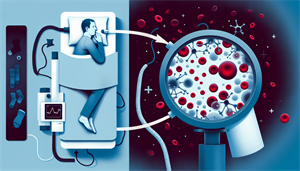
Can Sleep Apnea Cause High White Blood Cell Count?
Can sleep apnea cause high white blood cell count? This question has been asked by many, and current research suggests a compelling link between this common sleep disorder and your body’s immune response.
This article cuts through the medical jargon to present you with a clear, direct examination of how sleep apnea may influence white blood cell levels, grounding our discussion in scientific evidence.
Key Takeaways
-
Obstructive Sleep Apnea Syndrome (OSAS) is linked with systemic inflammation, contributing to cardiovascular diseases such as hypertension, stroke, and heart failure due to repeated airway obstruction during sleep.
-
Research suggests a correlation between OSA severity and increased neutrophil counts, indicating a potential contribution to leukocytosis and a heightened risk for autoimmune and cardiovascular diseases.
-
Continuous Positive Airway Pressure (CPAP) therapy has been effective in managing OSA and reducing inflammation and white blood cell counts, which may help lower cardiovascular risk and improve health outcomes.
Understanding Sleep Apnea and Its Effects on the Body
Obstructive Sleep Apnea Syndrome (OSAS) is a sleep disorder that can have profound effects on the body. It occurs when there are repeated episodes of partial or complete upper airway obstruction during sleep, disrupting normal breathing patterns, and leading to various health complications.
A higher Apnea-Hypopnea Index (AHI), indicating severe obstructive sleep apnea, is linked to poorer endothelial function and an elevated risk of cardiovascular complications. Thus, the severity of OSA might provide clues about the potential risk for inflammation and cardiovascular health problems.
Defining Obstructive Sleep Apnea
Patients with obstructive sleep apnea (OSA) experience a sleep disorder characterized by: Recurrent episodes of partial or full obstruction of the upper airway during sleep Interrupted breathing Adverse effects on the individual’s health and well-being Diagnosing OSA involves polysomnography - a comprehensive recording of biophysiological changes during sleep, which is an essential aspect of sleep medicine.
The severity of OSA is evaluated using the apnea hypopnea index (AHI), which encompasses all apneas, regardless of desaturation, and hypopneas accompanied by at least a 4% drop in oxygen saturation. A complex interplay of structural and nonstructural factors, including genetic predisposition, contributes to the pathophysiology of OSA. These factors involve anatomical susceptibilities of the upper airway and sleep-related changes that impact airway patency.
Systemic Inflammation in OSA
Obstructive Sleep Apnoea Syndrome (OSAS) goes beyond being merely a sleep disorder, as it also correlates with systemic inflammation, which may contribute to the development of cardiovascular diseases.
The potential influence of OSA on systemic inflammation is significant, contributing to conditions that create a favorable environment for cardiovascular diseases.
For those suffering from obstructive sleep apnea, heightened systemic inflammation is associated with a range of health complications. This inflammation is a recognized contributor to the onset of several cardiovascular diseases, such as: hypertension stroke heart failure coronary artery disease This links the two health conditions.
White Blood Cells: The Immune System's First Responders
Having covered the basics of OSA, let’s now turn our attention to white blood cells, or leukocytes. These cells are the immune system’s first responders and play a crucial role in protecting the body from infections and diseases. Leukocytes generally have a normal count ranging between 4,000 and 11,000/microliters in a healthy individual. Any deviation from this range can be an indication of a health issue.


